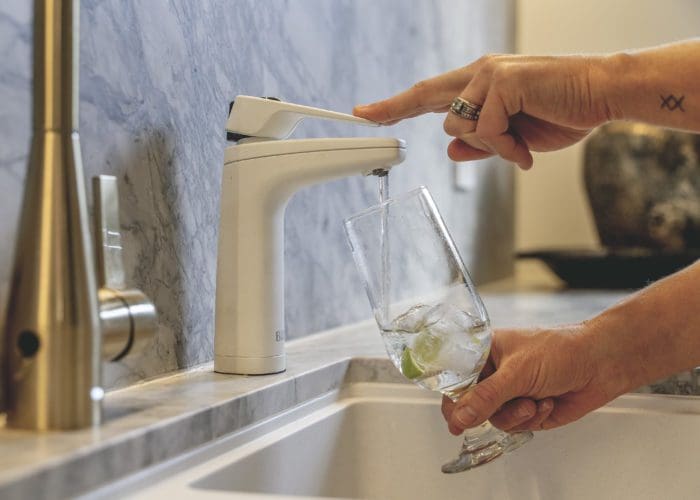Newest
Popular
Products
Can’t find what you are looking for, please call 1800 812 321 or email us on info@billi.com.au
Billi Media
Specifying the Home Water Filtration Systems
When choosing a drinking water filtration system, you first need to consider the type of contaminants to be removed from the incoming water supply, and how much drinking water might be needed every day.
Water filtration systems for the home will often have quite different capacity and flow requirements than their commercial counterparts.
Other practical considerations include budget, storage space, access to electricity and potable water, after sales support, and maintenance costs.
What does the filter remove?
The filter type you need will depend on what types of contaminants you are trying to remove from the water.
Sediment filters and activated carbon (depending on the micron rating) will likely be enough to deliver better tasting drinking water for most households.
Reverse osmosis and UV purification may be needed where deeper contamination or the spread of infectious disease is a concern.
Most popular filters have a micron rating.
The micron is calculated based on the distance between pieces of filter media.
The lower the micron rating, the finer the filtration.
The Micron guide:
- 5-micron filtration: will sieve out particles that are visible to the naked eye.
- 1-micron filtration: will remove particles that are not visible but are less likely to reduce lead and heavy metals, or parasitic cysts.
- 2-micron filtration: will sieve out particles, but also removes chlorine and organic chemicals, parasitic cysts such as Giardia and Cryptosporidium, lead, and other heavy metals.
The quality of the unit plays a large part in its effectiveness. Cheaper units often incorporate mid-tier filtration performance and can be expensive to run in the long term.
Some units will have lower quality filtration due to being made up of granules that are held together with a resin (therefore decreasing surface area). Cheaper filters also often result in ‘tracking,’ where the incoming water supply takes the same pathway or ‘track’ thus negating any potential cleansing effects.
Is it accredited and certified?
Manufacturers make a lot of varied claims about their water filtration systems, making it difficult to be sure water filters will do what they say. In this regard, it is important to check if the product has been accredited and certified under the relevant product standards.
The Australian WaterMark Certification Scheme requires products, including water filters, to meet relevant standards to ensure they are safe and fit-for-purpose.
To achieve certification, the water filter must be tested by a recognised testing lab, comply with AS 3497:2021 “Drinking water treatment systems — Design and performance requirements”, be manufactured in accordance with an approved Quality Assurance Program; and carry a warranty.
The National Sanitation Foundation (NSF) is probably the most widely recognised independent international body that monitors products that affect food or water safety. The NSF publishes several standards relating to water treatment systems.
While NSF standards are widely publicised, there are several equally well-accredited peer bodies, such as IAPMO R&T (International Association of Plumbing and Mechanical Officials Research and Testing), that provide certification and testing in accordance with comparative NSF standards.
How long will it last?
When the filter needs to be replaced is dependent on multiple factors, including how many contaminants are in the water, particularly sediment; the hardness & turbidity of the water; how often the filter is used; and the quality of the water filter membrane and media.
Manufacturers should provide clear instructions for how often you should replace the filters in the system.
Advanced filtration systems have indicators that will provide a warning, the filter needs to be replaced.
Higher-quality appliances can go as far as to include hygiene protection features in-built to ensure the same filter is not used in multiple machines.
Billi Water Filters
Billi water continues to partner with global leading experts BWT, Europe’s largest water treatment products company.
Billi’s range of premium filters utilises the unique Fibron X technology. Fibron X technology uses activated carbon fibre with minimal bonding agents in a graded density profile. Due to this structure, Fibron X media has a superior contaminant reduction performance and capacity than conventional water filters.
This advanced multi-stage filtration system filters out particles in water reduces chlorine and organic chemicals and enables minerals to flow through the appliance without allowing scale.
Billi filters have been independently tested and certified by IAPMO to international standards and Australian Watermark. Billi filter performance testing is conducted in accordance with international standards NSF, WRAS, and Watermark.
Billi’s range of filters allows to select the right filtration solution for all needs. The company’s 0.2-micron filter provides the highest level of filtration. The 5-micron filter provides a more standard option to improve your drinking water by removing sediment, chlorine and limescale which in turn improves taste and odour.
Billi filters are available on our website: Billi Filters

CATEGORIES
ARCHIVES
- April 2025
- March 2025
- February 2025
- January 2025
- December 2024
- November 2024
- October 2024
- September 2024
- August 2024
- July 2024
- June 2024
- May 2024
- April 2024
- March 2024
- February 2024
- November 2023
- September 2023
- June 2023
- April 2023
- March 2023
- January 2023
- December 2022
- November 2022
- October 2022
- July 2022
- June 2022
- April 2022
- March 2022
- January 2022
- December 2021
- November 2021
- October 2021
- September 2021
- August 2021
- July 2021
- June 2021
- November 2020
- June 2020
- February 2020
- January 2020
- November 2019
- October 2019
- September 2019
- July 2019
- April 2019
- March 2019
- February 2019
- November 2018
- May 2018
- February 2018
- October 2017
- May 2017
- January 2017
- October 2016
- September 2016
- April 2015
- March 2015
- November 2014
- October 2014




